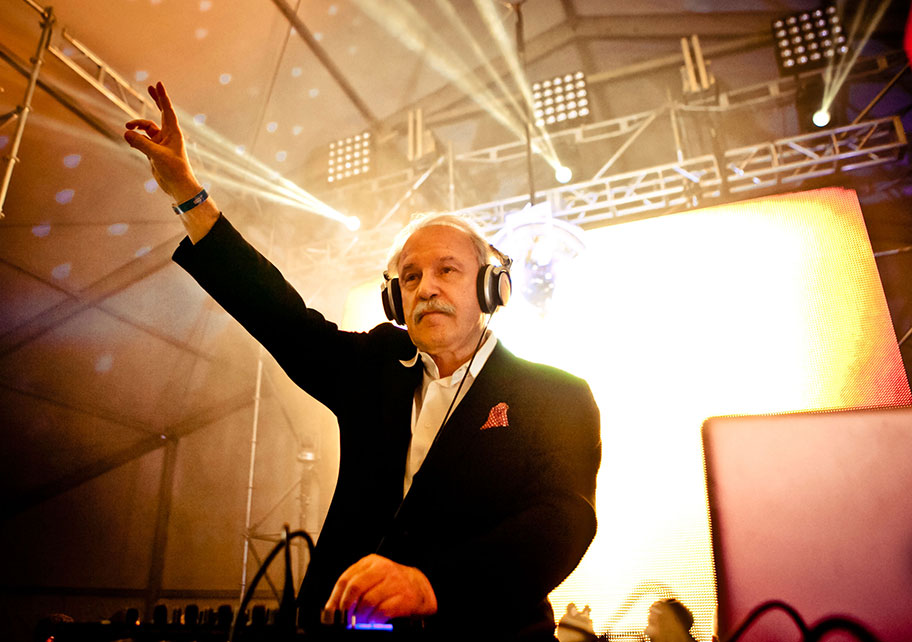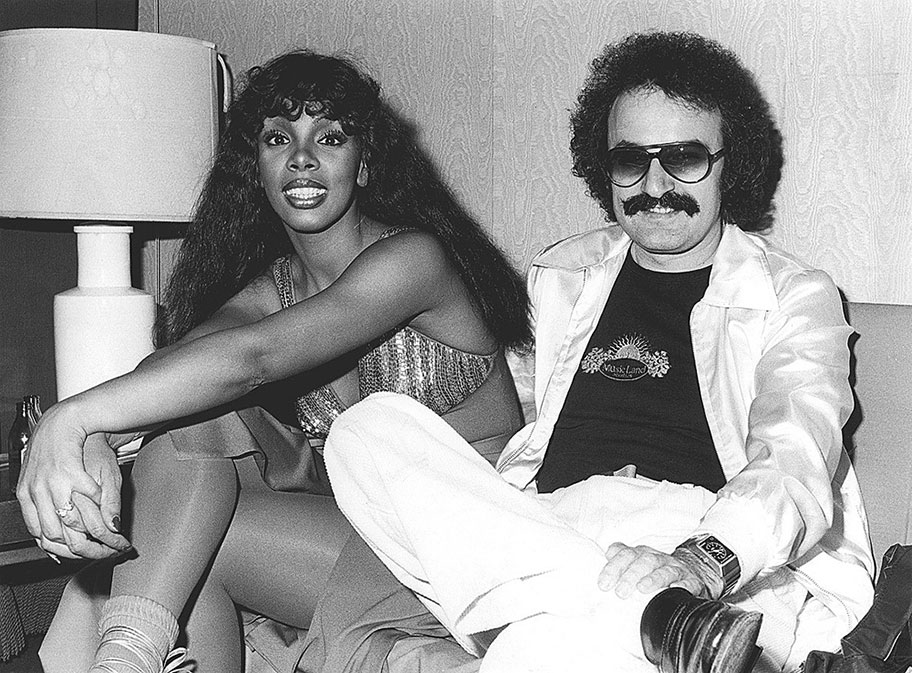Variety
Giorgio Moroder’s Third Act Evokes a Sense of ‘Déjà Vu’
By Andrew Barker
April 29, 2015

Despite celebrating his 75th birthday earlier this week, Giorgio Moroder has very abruptly become a very busy man.
A year after winning his fourth career Grammy (for his spoken-word contribution to Daft Punk’s “Random Access Memories”), he’s back on the road touring the nightclub and festival circuits as a DJ, remixing his hits for audiences young enough to be his grandchildren.
In June, he’ll release his first solo album since the Reagan era, “Déjà Vu,” with assists from the likes of Sia, Britney Spears and Kylie Minogue. He’s also in talks to score a new film, and he’s composing music for Disney’s next “Tron” videogame.
With such a sudden flurry of activity, one has to ask: Exactly what had the electronic music pioneer been up to in the studio for the past decade and a half?
“Basically, almost nothing,” Moroder says with a nearly audible shrug. “I had done so many albums, I was really half retired. I played my golf. I had a hundred different ideas: I did computer art, I did neon art, I built a car. Some ideas worked, some did not.
“I wasn’t really looking for a new career. That came automatically, without my help.”
A key driver behind his resurgence, of course, is his still-outsized footprint on America’s surging dance music scene. From his landmark early records with Donna Summer to his digital-prophet solo work, Moroder’s sound is still being vigorously stripmined by hip-hop producers and indie aesthetes, while “I Feel Love” and “Chase” could be remixed into most modern DJs’ sets without anyone batting an eye. The first musician to win an Oscar for an all-electronic score (“Midnight Express”), Moroder’s influence on the newer generations of film composers is just as obvious.
“I was surprised when I heard the soundtrack for ‘Drive,’ ” the Italian-born composer chuckles of Cliff Martinez’s Moroder-indebted score. “Couldn’t they have just taken some stuff from ‘Cat People’?”
After accepting a one-off engagement DJing for a Louis Vuitton fashion show in 2012, Moroder decided to learn his way around Ableton and head out on the road with house music legend Carl Cox as his “assistant,” quickly going solo for gigs from Las Vegas to Ibiza, and joining Minogue as an opening act for a leg of her 2015 tour.

Disco-era Moroder kicks back with his “biggest singer,” Donna Summer. (photo credit: Echoes/Redferns)
“I think I learned it quite fast. Being in a recording studio for more than 40 years and having mixed hundreds of songs, I didn’t really feel any pressure,” he says of his new trade. “It’s all relatively easy.”
His 1970s chestnuts still ignite dance floors, but lest anyone expect a collection of time-capsule disco workouts on “Déjà Vu,” Moroder reveals himself to still be a forward-leaning hitmaker at heart. The vintage vocoder effects and staccato synth pulses are still in place, but the new tracks reveal an old dog entirely comfortable with pop’s new tricks.
“Originally, we were talking with the record company about making a disco album,” he says. “But I didn’t want to go too far back. I really love EDM, but maybe I wanted to do EDM with more melodies, and I think I have them here. Because the scene has really changed in the past year. You have Avicii’s ‘Wake Me Up,’ that’s quite a departure, and even David Guetta has been changing a lot. So I think EDM is getting more into the traditional stuff where you have an intro, verse, chorus and more natural instrumentation.”
“Diamonds,” his collaboration with Charli XCX, bounces between snotty pop hooks and a wobbly, distorted low end that might have caused serious damage to Studio 54’s subwoofers. (“This one’s a little weird, with that bassline,” he laughs.) The Minogue feature “Right Here, Right Now” is an effortlessly sparkly slab of neo-disco, while “Wildstar,” with 25-year-old British singer Foxes, takes a number of Moroder signatures and marries them to a euphoric electo-orchestral sweep.
Securing access to such a wide range of singers was his primary stimulus to sign for RCA Records, Moroder says, after turning down a previous contract offer from a European label. “Obviously, Donna was my biggest singer and biggest artist,” he says of the partnership that produced such hits as “Last Dance” and “Bad Girls.” “She was just special. But the qualities I look for in a singer haven’t changed,” he notes, adding that he strove for a mix of established and up-and-coming talent.
Moroder reveals that he’s negotiating an offer to score a new film whose title he won’t divulge, though he does call it “a big one.” And a studio date with Lady Gaga remains on the calendar. But even if one takes the title of Moroder’s 2014 single “74 Is the New 24” at its word, there are some limits to how far his latest act can take him.
“I always wanted to do a musical, but then at the end I never pursued it enough, so maybe that will just be one of those things that I did not do,” he says. “Maybe I should stick with making new albums and playing DJ shows … and maybe scoring some movies … and then the videogame. I think that’s probably enough, right?”
